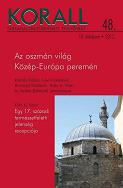Csengizáde Ali pasa és az Oszmán Birodalom határmenti elitje a krétai háború alatt (1645–1669)
Ali Pasha Čengić and the Frontier Elites of the Ottoman Empire During the War for Crete (1645–1669)
Author(s): Domagoj MadunićSubject(s): History
Published by: KORALL Társadalomtörténeti Egyesület
Summary/Abstract: The subject of this study is the intriguing person of Ali Pasha Čengić, a member of one of the most prominent families among the Bosnian Ottoman lords and his conduct during the Venetian–Ottoman War for Crete. For almost two decades, Ali Pasha was a dominant figure in the Bosnian eyalet, but he also maintained close and friendly ties with the Republic of Venice, and even went so far as to openly sabotage the Ottoman attack on Kotor in 1657. Thus far historiography has treated his person in a negative light: a traitor of the Empire serving his Venetian masters for money and personal gains, and who was – even by Turkish standards – extremely greedy, corrupt and cruel. I argue that the case of this controversial Bosnian grandee well illustrates the complexities of the Empire’s frontier. As demonstrated through a detailed reconstruction of his historical background, Ali Pasha was driven by motives other than simple material gain and his image should not be reduced to black and white, simply condemning him as a traitor. Above all, Ali Pasha Čengić was a wealthy lord for whom the family/dynastic interests came before everything else. The war between the Venetian Republic and the Ottoman Empire was initially successful for the Ottomans, but as it continued year after year the casualties among the Ottoman frontier elite grew considerably. In the conditions resulting from protracted warfare, their estates were frequently raided and plundered, and many from the Bosnian Ottoman elite were facing complete material ruin. Without the prospect of victory and peace in the near future, it should come as no surprise that some concluded that their dynastic/family interests diverge from those of the Empire they served and decided to find their own means to ensure survival.
Journal: Korall - Társadalomtörténeti folyóirat
- Issue Year: 2012
- Issue No: 48
- Page Range: 90-120
- Page Count: 31
- Language: Hungarian

